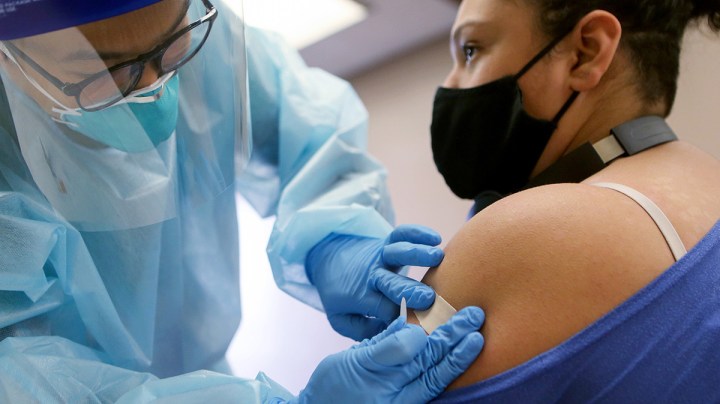Is a COVID-19 Vaccine Really Coming Soon?

A nurse applies a band- aid after administering the flu vaccination shot to a woman at a free clinic held at a local library on October 14, 2020 in Lakewood, California. Photo by Mario Tama/Getty Images.
The long-awaited vaccine against COVID-19 may finally happen—and soon. A 90% efficacy rate and no safety concerns in a study of this new Coronavirus immunization candidate means it’ll likely be submitted for Emergency Use Authorization (EUA) to the U.S. Food and Drug Administration this month.
If everything goes according to plan for Pfizer and BioNTech, the companies that developed the vaccine, an estimated 50 million doses are expected to be supplied this year.
To whom and in what order priority wise those doses will be delivered, however, is unknown. President-elect Joe Biden is expected to speak this afternoon regarding coronavirus; he may reveal more information then.
U.S.-based Latinxs have been disproportionately affected by the COVID-19 pandemic: The American Medical Association reported in May that more than 28% of people diagnosed with the virus are Hispanic.
Latinxs comprise a sizeable share of the “essential workers” population that’s at high risk of exposure, and many undocumented Latinxs have little or no access to healthcare. (Additionally, many undocumented people are also essential workers, intensifying the precarity of their situation.)
Black and Indigenous communities have also suffered the wrath of COVID-19 acutely, and for similar reasons—healthcare disparities and income inequity among them. These communities have seen the most deaths overall; Black people in the U.S. specifically are dying at twice the rate of white people.
Economically, marginalized communities have endured—again, disproportionately—the worst of what Covid-19 has wrought, from job losses to being turned down for small business loans via the Paycheck Protection Program. Black Americans, which includes some Latinx people, have fared worse.